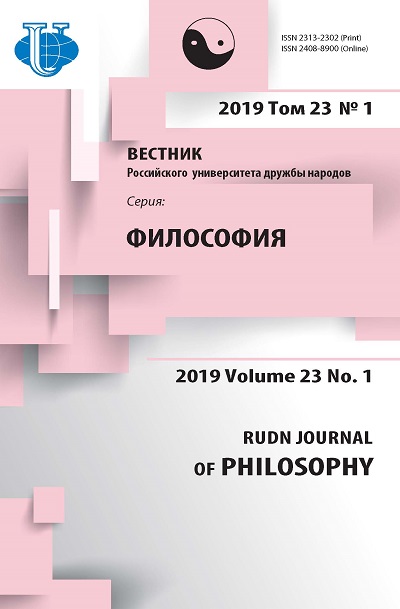ANTHROPOLOGICAL CRISIS IN THE RISK SOCIETY: PHILOSOPHICAL ANALYSIS
- Authors: Lomako OM1
-
Affiliations:
- Saratov State University named after N.G. Chernyshevski
- Issue: Vol 23, No 1 (2019)
- Pages: 66-73
- Section: SOCIAL PHILOSOPHY: LANGUAGE-MAN-SOCIETY
- URL: https://journals.rudn.ru/philosophy/article/view/20950
- DOI: https://doi.org/10.22363/2313-2302-2019-23-1-66-73
- ID: 20950
Cite item
Full Text
Abstract
The article is devoted to the philosophical consideration of anthropological crisis in the risk society in his historical transformation. The research is aimed to anthropological analysis of the risk society in order to identify its new features in the modern era. As a methodological principle of research, the author defines the distinction between anthropological and cosmological approaches in philosophy. It is about their complex relationships and contradictions in the development of the civilizational process. The anthropological crisis becomes apparent when society becomes a “society of risk” in the modern era. The article reveals the cause of the anthropological crisis in the risk society: the social production of wealth becomes the production of risks. In the XXI century there is a “world society of risk” (Ulrich Beck), which is associated with the process of globalization. The risk research methodology suggests the need to anticipate unpredictable. The main difficulty in risk analysis is that the risk is between certainty and uncertainty, between rational and irrational. Two main trends - the reflexivity of the unknown and the cosmopolitan moment - point to a global change in the society in the 21st century, whose priority is security. In the historical and social philosophical perspective, security is understood as a concept that encompasses integrity, inviolability, inviolability with respect to corporeality, life and property. In the context of the modern anthropological crisis, security has become the main value concept of the social political language. The logic of uniqueness gives way to the logic of ambiguity, which finds its expression in the connection of the risk society with the cosmopolitism. The “cosmopolitan moment” of the world risk society presupposes recognition of the uniqueness of the Other as an opportunity to overcome the anthropological crisis.
Keywords
About the authors
O M Lomako
Saratov State University named after N.G. Chernyshevski
Author for correspondence.
Email: olga-lomako@yandex.ru
-
83, Astrahanskaya Str., Saratov, Russian Federation, 410012References
- Arendt H. Vita activa or The active life. Munich, Zurich; 2014. (In Germ).
- Arendt H. What is Policy? Munich; 1993. (In Germ.).
- Arendt H. Between Past and Future. Munich, Zurich; 2013. (In Germ).
- Beck U. Risk Society. On the Way to Another Modernity. Frankfurt/M.; 2016. (In Germ).
- Beck U. World risk Society. In Search of the Lost Security. Frankfurt/M.; 2015. (In Germ).
- Conze E. Security in the Risk Society. Humane Orientation Science. Wurzburg; 2008. (In Germ).
- Gigerenzer G. Risk Savvy. How to Make Good Decisions. Munich; 2014. (In Germ).
- Honneth A. The Torn World of the Sociality. Frankfurt/M.; 2013. (In Germ).
- Salamun K. How Can a Person Be? Philosophical Ideal of a “Genuire” Man from Karl Marx to Karl Popper, Tubingen; 2011. (In Germ).
- Schmidt-Semisch H. Criminality as a Risk. Munich; 2002. (In Germ).
- Arendt H. The Hidden Tradition: Essays; 2008. (In Russ).
- Beck U. From Industrial Society to Risk Society. Thesis. 1994;(5). 161—168. (In Russ).
- Lomako OM. Social Philosophy of Hannah Arendt: Political and Ethic Aspects. Izv. Saratov Univ. (N.S.), Ser. Philosophy. Psychology. Pedagogy. 2015; 15( 3): 21—25. (In Russ).
- Luman N. Social Systems. Essay on the General Theory. St.-Petersburg, 2007. (In Russ).
- Marx K. Philosophical and Economic Manuscripts of 1844. Mosсow; 1965. (In Russ).
Supplementary files















